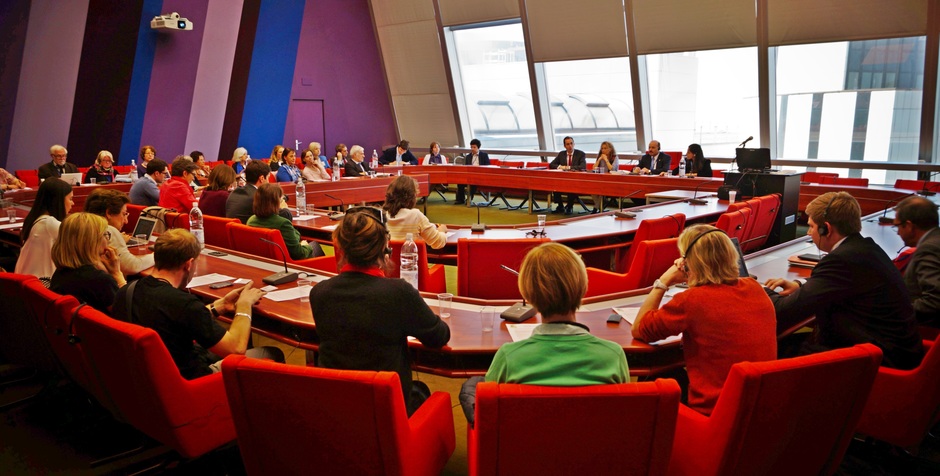

Defending Freedom of Expression, Freedom of Conscience and Parental Rights in “Morally Sensitive Matters”
Defending Freedom in Sensitive Matters
On Wednesday, April 24, 2013, the Parliamentary Assembly of the Council of Europe adopted by an overwhelming majority a Resolution on the protection of religious communities against violence[1]; a seminary also took place there, apprising of the new infringement of freedom of conscience caused in Europe by the laws concerning marriage and adoption for same-sex couples, and non-discrimination.
The seminary, co-organized by the ECLJ and Christian Concern, was presided over by Mr Luca Volontè, an Italian deputy chairman of the EPP (the main centre-right party) group, as well as the spokesman of the Resolution. European deputies, ambassadors and officials of the Council of Europe attended that seminary. The interveners have notably condemned the growing climate of hostility and intolerance towards Christianity in Europe and the people attached to the natural family and moral. This hostility entailed violence, increasingly open and tolerated, including by some mainstream media and political parties. Multiple assaults committed by groups such as FEMEN and the impunity they enjoy have been sharply criticized, even though in France many peaceful demonstrators promoting family values have been subjected to disproportionate police brutality and were arrested. A slideshow of these assaults and violent acts was presented. Several deputies agreed to examine the case. The Committee of Ministers of the Council of Europe will also be seized (it gathers the ambassadors of the 47 States members of the Council of Europe).
There was also much talk in this context, about the growing attacks against the freedom of conscience of people attached to the natural family and moral. Cases McFarlane and Ladele against the United Kingdom have been extensively discussed: they are the objects of a request for referral to the Grand Chamber in the absence of effective integration in a first judgment of the Court of the fundamental right of the applicants to conscientious objection (Eweida and others against the United Kingdom Affairs, n°48420/10, 59842/10, 51671/10 and 36516/10 of January 15, 2013). These cases concern a city hall employee assigned to the civil state and a marriage counsellor both dismissed after they expressed their inability, in conscience, to sexually advise a gay couple and celebrate their civil union. The European Court of Human Rights, in charge of their cases, did not deem these dismissals abusive in a judgment delivered on January 15 (See here a commentary). These Ladele and McFarlane cases are significant because they call into question the right of an employee not to be forced to perform some of their functions against their moral beliefs. This is the issue of conscientious objection in the workplace.
In this respect, the Resolution “Safeguarding human rights in relation to religion and belief and protecting religious communities from violence” (N° 1928) reminds the States of their obligation to respect, “in relation to morally sensitive matter”, freedom of expression, the right to conscientious objection of individuals and communities, and the educational rights of parents. This Resolution was initially focused on the violence against religious minorities outside Europe. However, given the surging wave of anti-religious violence and hostilities in Europe, the deputies included – intended for European countries – a reminder of some basic principles of freedom of conscience and religion currently threatened. This resolution may now be cited by advocates of parental rights, especially in education matters, and advocates for conscientious objection. It may as well be invoked by religious institutions (such as private schools[2] and religious employers) to preserve their institutional and moral autonomy against attempts to impose these institutions the new official morality (abortion, euthanasia, LGBT, education based on the theory of gender, etc.). Freedom of consciences, of families, of schools and of religious communities, as well as freedom of expression, must be defended, this resolution helps.
Regarding the right to conscientious objection, this Resolution extends the recognition of this right to all “morally sensitive matters”, including in the filed on health care and parental education. This is a step forward for the PACE who recognised this right explicitly before in relation to military service and health care (abortion). Now, it does recognise that freedom of conscience and conscientious objection apply to all morally sensitive matters and is not limited to the medical and army field. This Resolution
Here are the key clauses of the Resolution.
* About Freedom of Expression in religious and moral matters, the Assembly calls on States to:
- 9.9. accommodate religious beliefs in the public sphere by guaranteeing freedom of thought in relation to health care, education and the civil service provided that the rights of others to be free from discrimination are respected and that the access to lawful services is guaranteed;
* About the right to conscientious objection, the Assembly calls on States to:
- 9.10. ensure the right to well-defined conscientious objection in relation to morally sensitive matters, such as military service or other services related to health-care and education, in line also with various recommendations already adopted by the Assembly, provided that the rights of others to be free from discrimination are respected and that the access to lawful services is guaranteed;
* About the educational rights of parents, the Assembly calls on States to:
- 9.11. while guaranteeing the fundamental right of children to education in an objective, critical and pluralistic manner, respect the right of parents to ensure such education and teaching in conformity with their own religious and philosophical convictions;
*About the right to autonomy for religious communities, the Assembly calls upon States to:
- 9.13. ensure the full respect of Article 9 of the European Convention on Human Rights and relevant jurisprudence by the European Court of Human Rights since 1949 and that the freedom of communities and individuals defined by religion or belief is respected and exercised within the limits of the law;
* About the support to be given to persecuted religious communities outside Europe, the Assembly calls upon States to notably:
- 9.2. ensure that a democracy clause, incorporating religious freedom, is included in agreements between them and third countries;
- 9.3. take account of the situation of religious communities in their bilateral political dialogue with the countries concerned;
Resolutions of the Parliamentary Assembly of the Council of Europe are not directly restricting, but they are a source of right with political authority. The European Court takes it into account and the Committee of Ministers must respond to their requests. That being so, international institutions such as the Council of Europe, the Organization for Security and Cooperation in Europe (OSCE) and the United Nations, also have a role in monitoring and reporting abuses against human rights perpetrated by or within Member States. Those institutions are often the only legal resort allowing to denounce these abuses, to force governments to be accountable for these, and pressure them to put an end to it.
***
[1] "Safeguarding human rights in relation to religion and belief and protecting religious communities from violence" (Resolution N° 1928)
[2]“Public schools” in the UK












